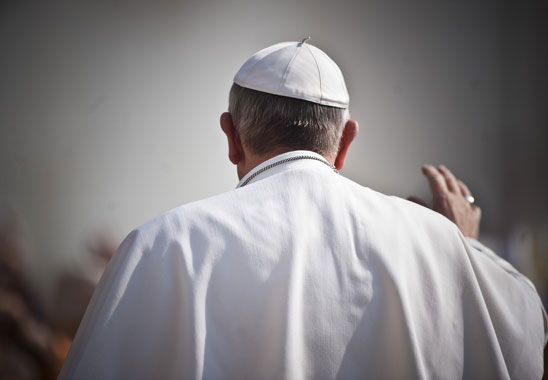
In his December apostolic exhortation, Evangelii Gaudium (The Joy of the Gospel), Pope Francis had harsh words for “the new invisible tyranny of the market.” This familiar denunciation of capitalism brings to mind a famous text by the French economist Frédéric Bastiat, published in 1848. Addressing the socialists of his day, who were already attacking the market economy, Bastiat replied that it is easier to identify and criticize what one can see (poverty or inequality) than it is to discern what one cannot see: the relentless economic growth that the market engenders. With all due respect to the pope, he has fallen into a rhetorical trap. In the name of the poor, to whom his life as a priest has been devoted, he denounces the visible and ignores the invisible. This is not insignificant, given the influence that this pope rightly exerts.
One of Francis’s predecessors, John Paul II, also pronounced on political economy. When Poland was freed from the Soviet empire in 1990, John Paul tried to prevent his country from slipping into capitalism, which he then abhorred as much as does Pope Francis. John Paul II believed sincerely in a Third Way, neither socialist nor capitalist, which would lead Poles from poverty to prosperity and social justice. Lech Wałesa, who had moved from union leadership to the presidency of the Polish republic, was singing the same tune. Post-Communist Poland soon sank deeper into poverty. John Paul II, honestly concerned, then took some lessons in economics. He chose as one of his mentors Michel Camdessus, then managing director of the International Monetary Fund and a fervent Catholic. Camdessus helped convince him that the market economy was only a mechanism, which, however imperfect, was the most effective means ever discovered for reducing mass poverty. Poland, still Catholic and converted to capitalism, is now the only European country to have escaped the crisis of 2008. Average income there has doubled over 20 years.
Camdessus was right: we should judge the market economy by its results, not by its values. Thus, Pope Francis is mistaken when he claims, in Evangelii Gaudium, that “the market is held up as divine.” I know no one who considers the market “divine”—certainly neither economists nor entrepreneurs. Similarly, when Pope Francis recommends “returning the economy to the service of human beings,” we can only agree, while observing that the market never functions except in the service of human beings. What human beings do with the products of growth, as well as how they distribute them, is an entirely different matter, and the Church has a legitimate interest in employing moral suasion in this area.
Pope Francis’s entourage currently does not seem to include an economist, and it is not clear that Christine Lagarde, present head of the IMF, possesses the necessary faith and modesty to instruct a pope. Since there is no obvious papal economics tutor, let us turn to a prudent people, albeit not a very Catholic one: the Swiss. Last November 24, in a referendum initiated by voters and supported by the Socialist Youth, the Swiss considered limiting the salaries of bosses to 12 times the lowest salary in their firms. Sixty-five percent of Swiss voters rejected this formula. Is this because the Swiss make a god of the market and adore overpaid bosses? I don’t think so. But they know from experience—or at least 65 percent of them do—that the market is imperfect yet useful and that it increases what Milton Friedman called “the freedom to choose,” including the freedom to choose Catholic morality and to practice charity and philanthropy. I suggest a pontifical visit to Switzerland.
